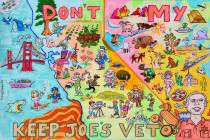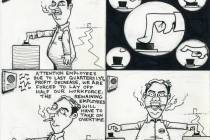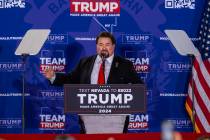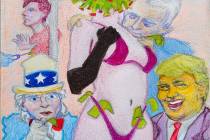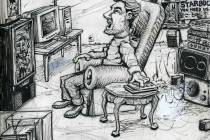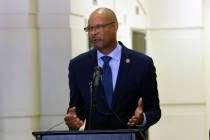The ethics of headlines
There's a story I've often told about journalism.
In 1980 the governors of California and Nevada, Jerry Brown and Robert List, met at Incline Village to discuss the future of Lake Tahoe.
Since so many reporters were on hand, a journalists' group held a lunch meeting during the conference. The speaker at the press meeting was List press secretary Bill Phillips. Among other things, he told us that he rarely had problems with the stories written about the governor. But the headlines were another matter, often projecting beyond the content of the stories or flat getting the stories wrong.
Later, there was a joint news conference of Brown and List at which Gov. List said he would call a special session of the Nevada Legislature to amend the bi-state Tahoe Regional Planning Compact but only if several conditions were met, so whether there would be a special session would not be known for a while yet.
The next day the headline in a Reno newspaper was, "List to call special session."
Headlines aren't necessarily, or usually, written by the reporters who write the stories. But the reporters certainly hear about the headlines.
For some odd reason, journalists don't usually think of headlines in terms of ethics. I ran a Google search for the phrase "ethics of headlines" and I got just five hits, and two had the same content. Looking for a longer view, I ran a search on Google Books and again got five hits. This time, three of them were the same quote, from George Wickersham in 1932. Wickersham was chair of a presidential commission appointed by Herbert Hoover to examine the problems associated with alcohol prohibition and in a speech to an American Society of Newspaper Editors, Wickersham said, "It would be interesting to gather together the headliners of the leading newspapers of the country and hear them discuss the subject of headlines ’ the principles on which they are formulated, the ethics of headlines, and the moral responsibility of those who make them."
As best I can tell, our calling never took him up on the idea. In fact, after Wickersham's speech was reported, Time magazine noted, "Next day Chairman Wickersham might have observed that the tone of headlines largely reflects the particular tenets of the journal which it adorns." Thus our profession made Wickersham's point.
I did find that the Society of Professional Journalists mentions headlines in its code of ethics. At least I THINK it does. One posting of that code at the SPJ website contains this language: "Make certain that headlines, news teases and promotional material, photos, video, audio, graphics, sound bites and quotations do not misrepresent. They should not oversimplify or highlight incidents out of context." However, at another page on the same website, the same code of ethics does not contain those words.
Some of the journalism textbooks I examined do not even mention headlines, much less their ethics. I did find one volume that touched on the topic. In "Strategic Copy Editing," John Russial wrote, "Editing is about ethics. It's about ensuring that stories are fair, that all sides are heard, that questionable assertions are questioned and that the accused have the opportunity to respond. Ethical issues underlie headline writing as well. The headline is often the only part of a story that a reader sees, and copy editors should write headlines that are fair and accurate, that preserve important qualification and attribution and that do hype the story. Editing is about a belief that fairness and balance serve everyone's interests best."
This week I feel considerable sympathy for those public figures who have been victimized by headlines. Last year I wrote a long piece describing the heavy scientific consensus in favor of genetically modified foods. Unfortunately it was published under the title "The organic foods lie," which did not reflect the article's content. I never faulted organic foods, but the headline got readers incensed before they read a word of the article. I spent the next week fielding angry messages.
My article was recently published as a chapter in a book and I made sure to get agreement from the publisher that it would run under a more accurate headline. Instead it ran under the headline "Science doesn't support organic food claims" even though my article contained language like this: "Interestingly, scientists and other experts who support transgenic foods are almost uniformly supportive of organic foods, too."
Those darned headlines.
Dennis Myers is an award-winning journalist who has reported on Nevada's capital, government and politics for several decades. He has also served as Nevada's chief deputy secretary of state.







